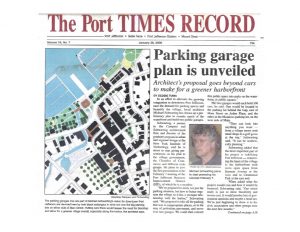By Leah S. Dunaief

This is a shout-out to all would-be entrepreneurs. Saturday marks the 47th birthday of The Village Times and hence the beginning of Times Beacon Record News Media. So, if you are thinking of starting your own business or organization, stop thinking.
Just do it.
We know whereof we speak. I mention our start to prove what can be done with energy, commitment, good helpers and a dream.
And a little bit of luck. While we started in 1976, during a depression in the economy, women were beginning to enter the workplace. We had some of the brightest members of the community looking for work just when we needed help the most.
To start something new, unless it is philanthropic in nature, you will need money. Obtaining start-up funds will measure how good a salesperson you are. You will have to communicate your idea and your passion to those from whom you are asking for funds.
We sold shares in a closed corporation to gather our initial underwriting.
Whom should you approach?
The answer to that depends on finding people who might share your passion for what you are starting or who love you enough to support your getting it off the ground. Unless you have tangible assets to offer as collateral, don’t bother going to most banks.
Since we were proposing starting a community newspaper, we went to members of the community and asked for their participation. At the time, the type of corporation we used limited us to 10 stockholders. I believe that is no longer the case.
How much to ask?
We had no idea how much it would cost to get started, so we picked a number that we thought would not seriously affect any investor if it were lost. We also tried to estimate how much the market of investors would be willing to spend.
The result: We were woefully undercapitalized and have always run from behind. That’s exciting but not smart business strategy. Ask others in your field who might be sympathetic to your efforts to estimate one year’s expenses, at the very least, and set that as your minimum goal.
When we ran out of money at a key moment, we were able to include one extra stockholder who brought us fresh cash. This was not necessarily appreciated by the other shareholders because it diluted their equity a bit. But we persevered.
It is vital that you know yourself. Being the founder is not for everyone. Most people would rather work for a company and receive a predictable paycheck rather than take chances every week with not meeting the payroll or being able to pay the bills. The boss has to deal with problems routinely that may seem far removed from the original goal of the company. Personnel matters are an example.
Don’t try to learn everything there is to know about your prospective business before you start, first because you can’t really know what lies ahead and also because you will learn more as you go forward. I believe we fell into every unimaginable briar patch that we could, including a move on us to become unionized, despite the fact that no community newspaper in the state had a union, and a lengthy audit for proper classification of our staff.
That can happen to you. We learned from every thorny experience.
Also, we were protected by our ignorance and just plowed ahead. Not considering failure kept it from entering our thinking.
Surround yourself with good workers. You may not be able to afford experienced people in your field, but more importantly, find bright helpers who totally share your dream. They, and you, will learn as you go. And attribute the successes to them because none of us can go it alone. It is the staff of our newspapers and media company that earned us 11 prizes in this past week’s annual Better Newspaper Contest for New York State publishers. Yay for each one and for the whole team together.
We have been lucky in being accepted and patronized by our customers: readers and advertisers. I believe that if you offer your best work and respond to their needs, all while maintaining a brand known for integrity, your customers will make you a success.
Go for it. And best of luck!




 As the village has increased parking capacity with more area and asphalt devoted to off-street parking, the less it has felt like an intimate village. Finding a spot, and the walk from your car — through other cars — to Main Street is not a pleasant start to a visit. In the planning to accommodate the car, the harbor front was converted from shipbuilding to parking, absurdly giving the car the best view of the harbor.
As the village has increased parking capacity with more area and asphalt devoted to off-street parking, the less it has felt like an intimate village. Finding a spot, and the walk from your car — through other cars — to Main Street is not a pleasant start to a visit. In the planning to accommodate the car, the harbor front was converted from shipbuilding to parking, absurdly giving the car the best view of the harbor.









